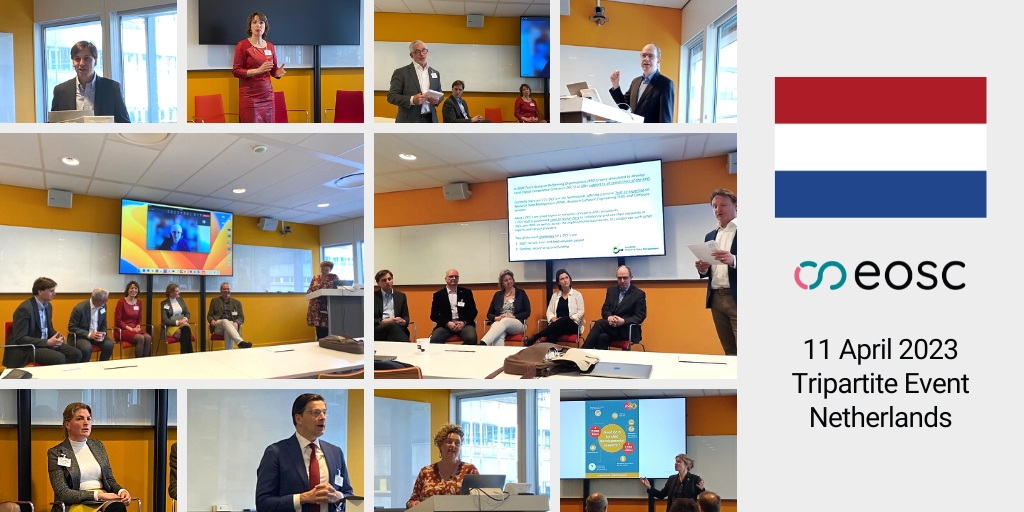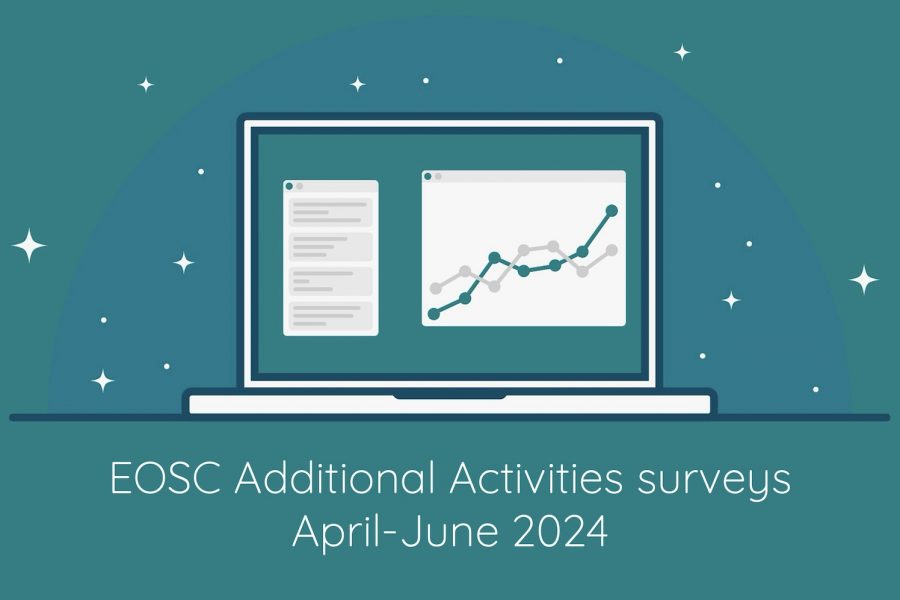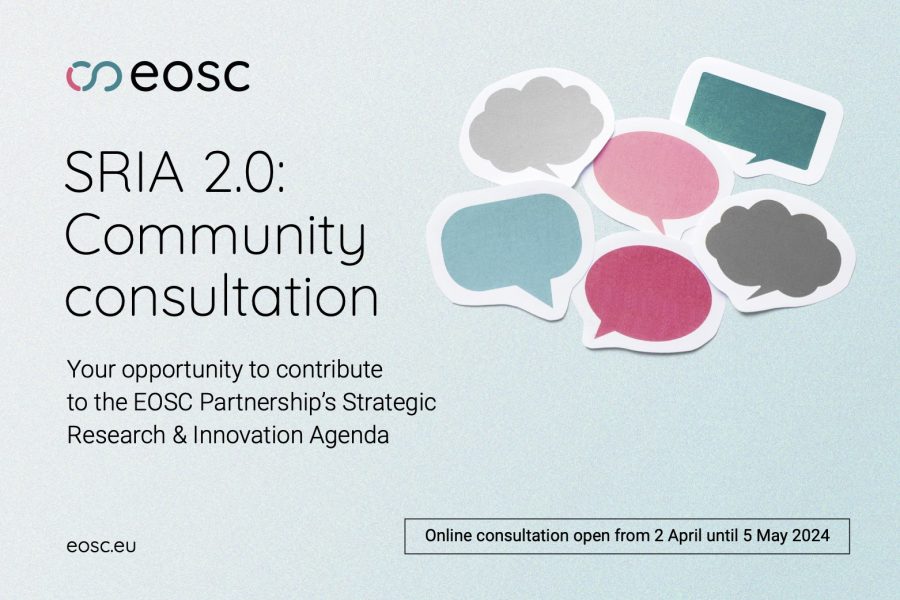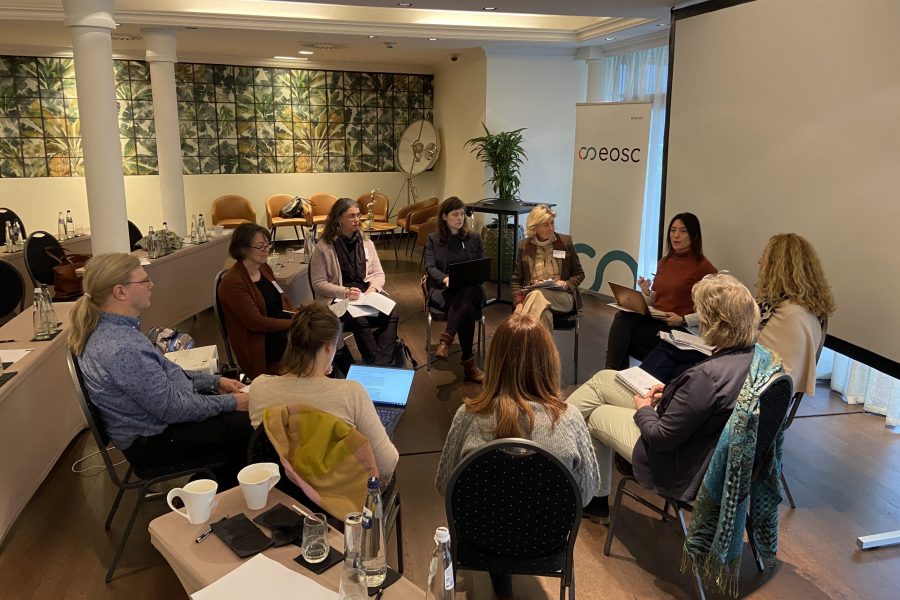SURF (the collaborative organisation for IT in Dutch education and research/Mandated Organisation of the EOSC-A) and the ministries OCW and EZK (EOSC Steering Board members) hosted the first national Tripartite event in the Netherlands on the 11th of April 2023. Approximately 50 different stakeholders were present including: researchers, representatives of the Open Science Communities, Open Science programmes and Digital Competence Centers from Dutch research performing organisations, service providing and funding organisations and delegates from national administrations, the European Commission, EOSC-SB and EOSC-A including our own president of the EOSC-A Karel Luyben.
After a warm welcome of Jet de Ranitz (CEO and Chair board of directors, SURF), Oscar Delnooz, (Director Research & Science Policy, Ministry of Education, Culture and Science) and Anna Panagopoulou (Director of European Research Area & Innovation at the Directorate General for Research and Innovation, EC) the first session regarding the perspectives on EOSC commenced.
Javier Lopez Albacete, Policy Officer at the Open Science Unit of the European Commission, mentioned the gap there is to fill between the policies and practices and the big challenge of not only creating EOSC as the data space for Research, but also making it interoperable with the other European Data Spaces that are being created. Karel Luyben focussed on the cooperation between EOSC and the E-infrastructures. He said that EOSC is being created to shape the European contribution to ‘Web of FAIR digital Objects’ coming from and servicing research, whereas Volker Beckman accentuated the importance of aligning good practices and examples between countries. ‘EOSC is a return on investments and there to stay, there is no way back!’
A beautiful example of Open Science in practice was presented during the keynote delivered by Chantal Kemner (Professor of Biological Developmental Psychology at Utrecht University), where her YOUth study, which follows children from the womb through the early life stages in their behavioural development, required the use of FAIR data over the past decade and resulted in 3 important lessons learned:
-
- FAIR requires teaming up of support and scientific staff.
- FAIR challenges the organisational governance.
- We should rethink the funding schemes to make FAIR data sustainable via software, infrastructure, and procedures.
A first panel session followed, where the importance of institutional and disciplinary expertise was highlighted in relation to the Local and Thematic Digital Competence Centers (DCCs) and the challenges they encounter in the Dutch Open Science landscape. To be able to realise the adequate expertise and sufficient capacity of the required professionals, it is crucial that all stakeholders work together in expanding adequate funding mechanisms and implementing (national) curricula and career paths for data professionals.
Jeroen Rombouts (Coordinator Research Data Management EUR/chair IN-DCC) addressed the issue that decision makers at the institutional level, such as the deans or the board of directors in research performing organisations, should take an active role and show leadership to stimulate the further development of DCCs to facilitate Open Science practices.
Celia van Gelder (Training Programme Manager DTL/Network Manager TDCC Life Sciences & Health) mentioned the importance of the development of Thematic Digital Competence Centres which have a focus on domain specific expertise. Collaboration between Local DCCs and Thematic DCCs will provide researchers with generic and domain specific support.
Eduarda Centeno (Board member, Open Science Community Amsterdam) highlighted the importance of voluntary based Open Science Communities at the Dutch Universities in the Open Science ecosystem. She noted that funding for those communities is needed and would help the sustainability of upholding the quality of those communities.
Just before lunch, Hans de Jonge, director of the newly founded ‘Regieorgaan Open Science NL’, presented this new funding organisation in the Netherlands. Over the next 10 years, 200 million euros will be made available to boost the transition of Open Science in the Netherlands and make Open Science the new normal.
After lunch, a last panel session discussed EOSC in practice, outlining the opportunities and possible challenges. One of the challenges discussed was how to collaborate with the private sector in the Open Science landscape while safeguarding autonomy, transparency, and accessibility.
Joris Van Eijnatten (General director, eScienceCenter) addressed the difference to be made in Open Science between data and software. High quality software needs to be kept alive to evolve adequately. Machteld Haaksman (Manager Social Impact & Open Science, Min OCW) confirmed that in some countries there is a focus on high quality software on the national level, but these challenges on a European level are more diverse and complex and need to be put highly on the agenda as well.
In her closing remarks, Jet de Ranitz made clear that there isn’t so much difference between the national and the European agenda. There are a lot of different bodies working on Open Science and one of the most important challenges will be to connect those different dots to put the shared agenda forward together. “More collaboration is necessary. The time frame to have the conversation is now. We’ll lose the window of opportunity otherwise.”





